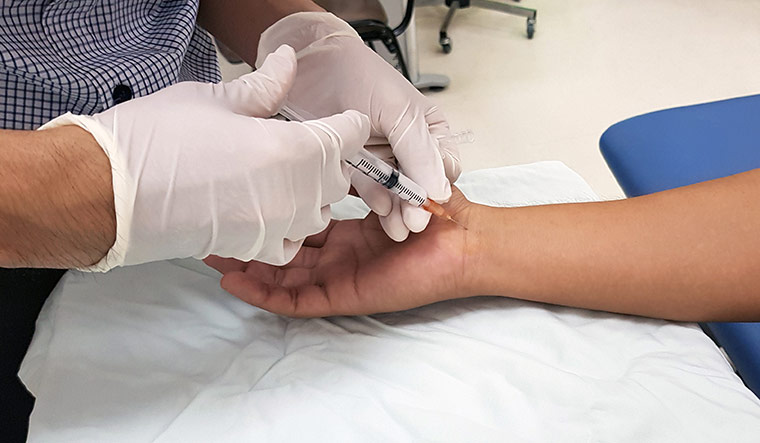ACCORDING TO A Chinese study published in the European Journal of Preventive Cardiology, parental alcohol consumption in the months before conception can increase the risk of congenital heart disease in their babies.
The researchers analysed 55 studies that included 41,747 babies with congenital heart disease and 2,97,587 without. The risk of congenital heart diseases gradually rose as parental alcohol consumption increased. Babies had a 44 per cent increased risk of congenital heart disease if fathers drank alcohol three months before conception, compared with babies whose fathers abstained. If mothers drank three months prior to conception and during the first trimester, babies had a 16 per cent higher risk of congenital heart defects.
Five or more drinks per sitting was linked to a 52 per cent higher likelihood of having a baby with birth defects for men. It was 16 per cent for women.
Forcing will not help
CHILDREN WHO ARE forced to diet or lose weight by their parents are more likely to be obese as adults and suffer from eating disorders. The study published in the Journal of Adolescent Health was based on 1,116 adolescents (61 per cent girls) who completed surveys in 1998-1999.
Follow-up surveys were completed every five years from 2003 to 2016. More than 40 per cent of women and 27 per cent of men said their mothers had encouraged them to diet to stay slim. About 20 per cent of women and 18 per cent of men had received similar messages from their fathers.
Parental pressure to lose weight was associated with poor health, unhealthy weight-related behaviours and lower psychosocial wellbeing in young adulthood. Girls and boys who had been pressured to diet had a 49 per cent and 13 per cent higher odds of being obese as adults, respectively, compared to those who did not face any parental pressure.
The likelihood of being obese was 29 per cent higher for girls whose parents resorted to extreme weight control behaviours and 12 per cent greater for boys. Girls had a 17 per cent higher risk for binge eating. The risk was 39 per cent greater for boys.
Tone matters
WANT TO GET your teenager to listen to you? Talk to them in a warm, supportive voice.
According to a British study published in the journal Developmental Psychology, teenagers are less likely to listen to their mothers when spoken in a controlling tone of voice.
The study examined how 1,000 teens would respond to their mothers when receiving instructions in different tones. The mothers used either a controlling, supportive, or neutral tone of voice.
Teens were more likely to engage and respond positively to instructions that conveyed a sense of encouragement and support for self-expression and choice.
Speaking in a controlling tone elicited a range of negative emotions and less feelings of closeness.
“If parents want conversations with their teens to have the most benefit, it is important to remember to use supportive tone of voice. It is easy for parents to forget, especially if they are feeling stressed, tired or pressured themselves,” said the study author.
Radiation after surgery, not a must
RADIATION THERAPY right after surgery may not be necessary for men with prostate cancer, according to a study presented at the European Society for Medical Oncology meeting.
To find out whether the benefits of radiotherapy after surgery outweigh the side effects, the researchers enrolled 1,396 patients after surgery for prostate cancer. They were randomly assigned to either radiotherapy right after surgery or to an observation-only group that received radiotherapy only if the disease recurred.
The study did not find any difference in disease recurrence at five years between those who had radiotherapy shortly after surgery and those who had radiotherapy later, if the cancer came back.
Eighty five per cent of the men in the radiotherapy group were cancer-free five years after their surgery compared to 88 per cent in the standard care group.
Omitting or delaying radiotherapy can help many men avoid the side-effects of radiotherapy such as urinary incontinence and narrowing of the urethra, which can make urination difficult.
Did You Know?
A single child is not more self-centered or narcissistic than children with siblings.
Social Psychological and Personality Science
Sleep at least six hours
MIDDLE-AGED adults with high blood pressure, type 2 diabetes, heart disease or stroke, who sleep less than six hours a day, could be at an increased risk for cancer and early death.
For the study published in the Journal of the American Heart Association, researchers analysed data from 1,654 adults, aged 20 to 74 years old. More than half of the participants were women. Of the 512 people who died during 20 years of follow up, one-third died of heart disease or stroke and one-fourth died due to cancer.
People with high blood pressure or diabetes who slept less than six hours had twice the risk of dying from heart disease or stroke compared to those who slept for more hours.
People with a history of heart disease or stroke who slept less than six hours had three times the increased risk of dying from cancer. These associations remained even after accounting for sex, age, race, smoking, obesity, or other physical or mental health conditions.
Exercise helps, in all ages
ACCORDING TO A French study published in the Canadian Journal of Cardiology, regular exercise will benefit all patients with cardiovascular disease regardless of their age.
Older patients are especially at a higher risk for complications and accelerated physical de-conditioning after a cardiovascular event. But often they are not referred to cardiac rehabilitation programmes.
The study was based on 733 patients who participated in a 25-session cardiac rehabilitation programme. They were divided into three subgroups by age: under 65, between 65 and 80, and 80 and older.
Exercise benefited all patients regardless of their age.
“We found a few weeks of exercise training not only significantly improved exercise capacity but also decreased anxiety and depression. Patients with the greatest physical impairments at baseline benefited the most from exercise,” said the study author.
Did You Know?
Your personality as a teen could predict your risk of dementia: those who were calm and mature as teens had a 10 per cent reduced risk of dementia in their 70s.
JAMA Psychiatry
More harm than good
CORTICOSTEROID injections are often given to patients with osteoarthritis to reduce pain and inflammation.
But according to a US study published in the journal Radiology, these steroid shots can accelerate osteoarthritis progression and joint destruction. The study was based on 459 patients who had one to three corticosteroid injections for hip or knee arthritis in 2018.
Eight per cent of the patients suffered complications: 26 patients had a quick progression of their arthritis; three patients suffered rapid joint destruction, including bone loss; four had stress fractures; and three had complications from osteonecrosis, where bone tissue dies. The complications were detected, on average, seven months after the corticosteroid injection.
Ageing indicator
SLOW WALKING could be a sign of accelerated physical and biological ageing, according to a US study published in JAMA Network Open. The study included nearly 1,000 people born between 1972 and 1973 in Dunedin, New Zealand. They underwent frequent tests that assessed vision, hearing, neuropsychology, musculoskeletal health, respiratory and cardiovascular health, social and lifestyle habits, mental health, reproductive and sexual health, physical and grip strength, and facial ageing from birth to age 45.
At age 45, slow walkers showed more signs of ageing. They had lower total brain volume and cortical thickness, reduced brain surface area and higher incidence of white matter hyperintensities, which is associated with cognitive decline and dementia. Their lungs, teeth and immune systems were in worse shape than fast walkers. They also looked older to a panel of eight screeners who were asked to guess each participant’s facial age from a photograph.
Irregular periods? Be cautious
WOMEN WHO consistently had irregular periods or extra-long menstrual cycles had an increased risk of death during twenty years of follow up.
The study presented at the American Society for Reproductive Medicine meeting analysed data on 93,775 women without a history of cardiovascular disease, cancer or diabetes.
The participants provided information about the usual length and regularity of their cycles. The women were followed from 1991 to 2013, during which time 1,679 people died including 828 from cancer and 166 from cardiovascular disease.
Women who consistently had irregular periods between the ages of 14 and 17 were 21 per cent more likely to die from any cause during the study than women with regular periods. The risk was 34 per cent higher for women who had irregular periods from 18 to 22. A similar association was seen in women with irregular menstrual cycles from ages 28 to 48.
Women who had longer cycles (more than 32 days) were also more likely to die from any cause during the study, than women whose cycles lasted 26 to 31 days.
CONTRIBUTOR SHYLA JOVITHA ABRAHAM








